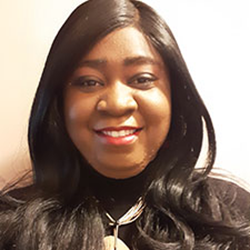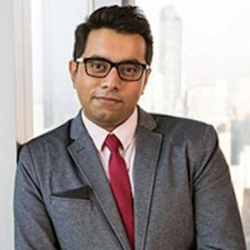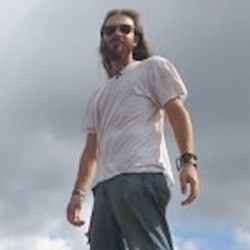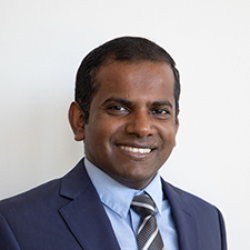Candies Kotchapaw

Founder and Executive Director, DYLOTT
Social Work, Bachelor of Social Work (BSW)
Why did you decide to become a social worker?
My family wasn’t rich, but We grew up in a part of Jamaica that had a lot of poverty. Many kids my age would regularly go without dinner or lunch at school, and I would share my food so that they had a meal.
When I came to Canada, my older sister suggested that I become a lawyer, but the length of time in school was a big deterrent, so I decided to complete a Child and Youth Work diploma at George Brown College. After working with children, I applied to York’s BSW program. Throughout my BSW, I worked with different social service organizations to figure out my area of interest. It wasn't until I completed my MSW at York that I started to see the synergies between what I was doing as a kid and how policies impacted people. My MSW gave me the opportunity to assess, reflect, and understand the gaps in social services, make the connection between policy and service, and how it impacts Black youth. I started to see social work as a dynamic profession where I could use the theories learned in my BSW and MSW, to inform how I operate and engage on various social issues.
Could you talk about your social work journey after completing your BSW & MSW?
My journey in social work has not been linear. My interest was in policy work, but I did not know how policy could be incorporated into my practice. My first experience in political social work was during my BSW placement when I completed a split placement as a member of parliament and a member of a provincial Parliament's office. I learned how elected officials delivered services and advocated for their constituents at the legislative level, this opportunity really ignited a passion for me.
Although policy work is not a traditional space for social workers, it’s very important for us to understand how policy decisions are being made and operationalized in communities. For example, During my MSW placement, I worked with the Ontario Nonprofit Network, which brought organizations together to discuss and advocate for specific goals impacting the sector. I participated in budget consultations and readings to dissect government bills that would eventually become law. During these readings, we determined potential harm for communities, gaps, and interpret information that is embedded to make it difficult to decipher for non-government employees. My supervisor stressed the importance of knowing how to read policies and understand the language so that I can advocate for or against a bill. This practical experience was incredibly valuable.
After graduating, I travelled to Seattle for a social work conference, to present my research paper, ‘The Politics of Social Work, do Racialized Social Workers Belong in the Practice Space of Public Policy & Development?’, this was a major milestone. Afterwards, I went from one contract to another and working multiple part-time jobs in grocery stores and call centers and did not understand why it was so difficult to secure a permanent job in a relevant field. During this time, I researched the Black experience of precarious work and was able to present my findings at conferences in the UK and South Korea. I then realized that I wanted to create programs and services that provide opportunities to people who are falling through the gaps. Over the next 2 years, I began to build Developing Young Leaders of Tomorrow, Today (DYLOTT).
You mentioned the importance of budget day announcements, could you describe what that entailed?
Budget day announcements is when our provincial or federal government is reporting their decisions on what is included in the budget for the fiscal year. Government staff meets to analyze, review, and discuss the budget document that outlines the financial commitments on education, health care, social services etc. We needed to be well versed in what to look for as hundreds of pages are reviewed with a fine-tooth comb, as there can be hidden language that might mention, for example, slashing the education budget. I found it interesting that my Field Supervisor and I were the only social workers in the room, and it reiterates the importance of social workers being active in the government decision process as it can really impact our clients, service users, and communities. From this experience, I had the opportunity to sit in the federal level 2021 budget announcement and was interviewed by CTV’s Lisa LaFlamme to provide feedback on the announcement about the $ 10-a-day universal childcare commitment.
My placement experience illustrated the importance of having social workers involved in government and policy work. In fact, I created three modules with the Ontario Association of Social Workers to provide more information about policy practice. It's important to embed policy work within Social Work education, especially now. Social workers need to be well versed in policy issues because our society is shifting, and poverty, alienation, and disenfranchisement are increasing for women, marginalized youth, and racialized communities. For social workers, it will make our work even more difficult because we will be operating with even less, while still providing the same level of support.
Could you talk a little bit about DYLOTT and your position with the organization?
I am the Founder and Executive Director of DYLOTT. We are known as a B3 organization which refers to being Black-led, Black-serving and Black-focused. We have two official programs, Lead Like a Girl and The Black Diplomats Academy.
Our Lead Like a Girl program works with girls aged between 6-17 and is considered an ‘early intervention’ program because it reaches young Black girls before society embeds stereotypes and narratives about their identities. We provide leadership, education, and training in niche areas that are not typically discussed in Black communities. We strive to provide opportunities to strengthen their confidence by interviewing and being mentored by women who are senators, CEOs and leaders in their community or an organization, and other powerful positions. We work with Black women, but we also recognize, and that representation is often a challenge at these levels, and we work with women in leadership, regardless of their skin colour.
Our second program is The Black Diplomats Academy or BDA. We started in Etobicoke North in Rexdale, but our reach has expanded nationally and internationally. The Academy works with Black youth and professionals between the ages of 18-35. The goal is to recognize the challenges in the world, as a Black person, and to recognize the systemic barriers to diplomacy work. We utilize what I have coined ‘Black diplomacy’ which refers to using Black people's lived experience to navigate systems and structures that were not created with our intentional participation in mind. The Academy exists as a way to identify gaps in global affairs and global governance. Black youth are not well represented, and this program was created to overcome access barriers. In 2021 we had 20 people graduate, in 2022, 27 people will graduate and we already have a waitlist for next year!! It shows the demand for a program like this.
We have 2 pilot projects that work towards overcoming barriers to participation and inclusion. The first is a curling program for kids and families, a non-traditional sport for Black communities, and the second is for youth to gain experience in cyber security and technology.
Could you tell me what you really love about the work you are doing and some challenges you face?
I continue to be inspired in my job when I get to see change happen in real time. Rarely do you see the fruits of your labour when working in advocacy and activism, so I’m lucky that I’ve been able to see positive changes. Recently, I was at the United Nations in New York, attending the High-Level Political Forum, where very few social workers are invited to attend as part of the Canadian delegation speaking about sustainability and improving communities.
The challenge I’ve experienced is that there are a lot of barriers including economic justice barriers. For example, even though the Black Diplomats Academy is well recognized for the impressive work that is being done, we have zero government funding, and as a nonprofit organization that is a real challenge. Even with the phenomenal work that is happening at DYLOTT, we are still fighting for our organizational lives, because we can't hire full-time staff to support the work. We are figuring out how to address gaps and support Black youth, while also learning how to make magic out of nothing. Our biggest challenge is obtaining the resources to support these individuals.
Can you provide a brief description about the UN High Level political forum and why it's so important?
The forum is where 193 UN ‘member states’ or countries, report on what they are doing to meet the 17 Sustainable Development Goals (SDGs) by 2030 and is a call to action. The forum is an opportunity for countries, civil society, and collaborators to participate in a Voluntary National Review to discuss and debate the progress being made towards attaining the SDGs. DYLOTT’s Academy alumni were invited to attend and take part in the discussion to learn about how global decisions are made.
DYLOTT focuses on many SDGs, for example, Goal 4 - Access to Quality Education, we’ve incorporated experiential learning in the form of internships so the youth can gain experience in the field. Goal 5 - Gender Equality, is evident in our Lead Like a Girl program as it focuses on gender equality and the lack of opportunities that exist for women and girls globally. Goal 8 - Access to Decent Work and Economic Growth, we support youth to gain access to the experiences that they need to achieve their career goals. Goal 10 - Reducing Inequality, we challenge the structures that exist, and we look for ways to reduce barriers to learning and employment.
Could you share a career highlight?
Attending the UN High-Level Political Forum alone was a career highlight. Seeing young Black Canadians, who are members of the Academy, being fully engaged in conversations at the UN was really memorable. The Academy exists to support young Black Canadian professionals to attend events like the UN High-Level conference to help build confidence and provide the opportunity to represent Canada. As well. Canada hosted a reception for the UN High Level Forum, and a member of the Academy was able to ask Canada's Permanent Representative to the UN, a question on the SDGs, it's equivalent to asking the prime minister a direct question! This was a career highlight for me!
During UN High Level, I joined the Youth Consultation for the Development of a United Nations Youth Office. The Secretary General of the United Nations called for consultation on developing a youth focus mechanism and it was facilitated by the Permanent Representative of Guyana and Egypt and the Youth Envoy for the United Nations. I had the opportunity to present recommendations and spoke about the Permanent Forum for People of African Descent which was adopted in 2021. I didn’t think anyone was paying attention, but I got several encouraging messages and a representative from the World Economic Forum said that they listened to my speech and thought that it was phenomenal, which blew my mind!
What did you take away from the School of Social Work?
After reflecting on what I learned in York’s BSW and MSW programs I realized the importance of the critical approach. It encouraged me to analyze certain systemic reverberations that were not being interrogated in community practice. I feel privileged to have learned from the critical lens as it taught me to analyze structures and systems in different ways. A lot of the skills that I’ve developed came from the education and experiences that I’ve received from York which I use every day. My MSW was focused on representation in policy development and there wasn’t a whole lot of people interested in policy, we definitely need more social workers in policy work!
What’s the best career decision that you’ve made?
The best career decision wasn’t actually made by me, it was made by my employer! At the time I was on contract at the provincial level with a political party doing administrative assistance. After the 2018 election, I did not get called back to work and was quite upset as I had already completed many contracts. In hindsight, if I had been called back, I would have never created DYLOTT or been able to provide these programs to help encourage and support young Black leaders and their families. Using the systems mapping, I can see gaps and challenges so that I can bring positives changes. It was difficult not knowing how things would end up and, at times, the challenge felt insurmountable. It can be difficult to remember that this is just a period in time, and it will get better. Looking back, I wish I could tell myself that it is going to be better than you imagined.
What advice would you give to new social work graduates?
I think that new grads and students should do their labour market assessment and pay attention to what skills and experiences are in demand because the labour market is shifting. I would encourage students and soon-to-be grads to acquire as much knowledge about their field of interest and build a good network of personal and professionals’ people who can support and motivate when times are tough. Spend time to figure out what your passions are and lean towards your strengths to help identify what makes you pop!
Browse more Alumni profiles
Sociology
1990
President, Designs by O'Brien, Designs by O'Brien, Interior Design Company
Commerce
Bachelor of Commerce (BCom)
2010
Manager, Investor Engagement and Outreach,
Graduate Program in Public Policy, Administration & Law
Master of Public Policy, Administration and Law (MPPAL)
2010
Head, Policy & Stakeholder Relations, Transportation Services, The Regional Municipality of York




